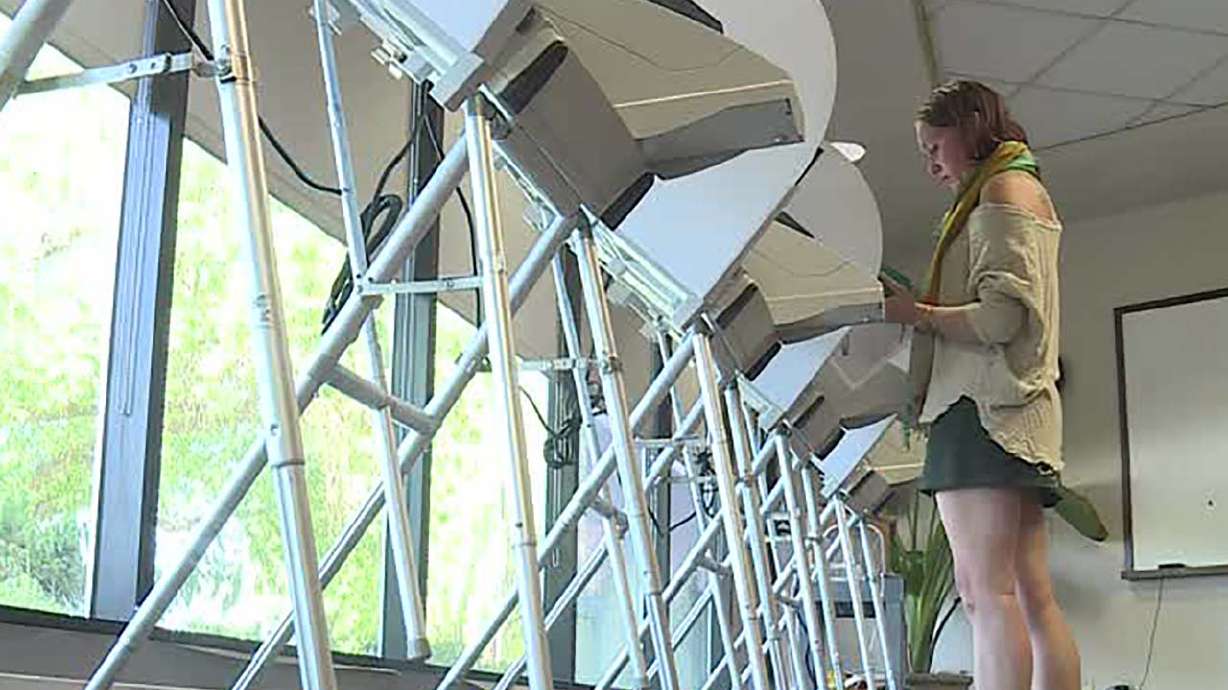Estimated read time: 3-4 minutes
This archived news story is available only for your personal, non-commercial use. Information in the story may be outdated or superseded by additional information. Reading or replaying the story in its archived form does not constitute a republication of the story.
SALT LAKE CITY — Utah officials participated in a series of webinars Thursday about ranked-choice voting, an alternative polling method that allows voters to rank candidates in order of preference rather than voting for just one.
Hosted by the Utah Ranked Choice Voting organization, the webinars were attended by Utah Rep. Marc Roberts and by Utah County Clerk/Auditor Amelia Powers Gardner, whose county piloted the use of ranked-choice voting in Payson and Vineyard municipal elections in 2019.
Ranked-choice voting has also been used in state party politics, including by both Republicans and Democrats during their conventions earlier this year.
There are several different ranked-choice methods, but the most common involves selecting just one winner from a field. If no candidates receive more than 50% of the first-place votes, the candidate with the fewest first-place votes is eliminated. Voters who chose the eliminated candidate will then be counted as voting for their second choice, and so on, until one candidate has a majority.
Payson and Vineyard used a variation that allowed them to select multiple city council candidates rather than just one. During the virtual presentation, Powers Gardner said she was in an ideal position to try the new voting system in 2019 because it was her first year on the job.
"A lot of my peers are very resistant to ranked-choice voting," Powers Gardner said, "but my peers are resistant to all change."
They see it as "a disruption in their current process," she said, but Utah County's elections systems needed an overhaul across the board. "I had to disrupt my entire process anyway."
Roberts, R-Salem, said he's been introducing ranked-choice voting legislation since 2015. "It's something I've always been interested in," he said, having utilized it at the party level for quite some time.
Not until 2018 and a House bill, though, did Roberts' ranked-choice bill pass the Legislature and become law. That bill gave municipalities the option to pilot ranked-choice voting in their elections.
"Payson and Vineyard stepped up and said, 'Hey, we want to do this,'" Roberts said. "They held their elections that way in 2019. ... (It was) very successful. A lot of good feedback on that."
The pilot program was designed to introduced ranked-choice on a small scale before deciding on possible broader implementation. With the municipal elections, Utah County was able to see how ranked-choice affected its own processes while also gauging voter support for the new method. Powers Gardner said the vote ended up being quite easy for the county to implement, as it didn't require any special new equipment and was able to order ballots from its usual supplier.
"You can do it using the processes and equipment that you currently have," she said.
Powers Gardner said the tabulation process didn't require a lot of extra time on the back end, either. But what of the voters?
Utah County sent a survey to Payson and Vineyard voters after the election and received responses from more than 10% of them. Of those respondents, 84% thought ranked-choice was easy to use and 83% would favor its continued use in the future.
"It wasn't even close," Powers Gardner said. "People loved ranked-choice voting."
Roberts said ranked-choice is developing strong bipartisan support in Utah, but it will be up to future Legislatures to determine if the process ever goes beyond its current municipal option. Elsewhere around the country, ranked-choice is being introduced on ever-larger scales, with Maine going so far as to use ranked-choice for its statewide, Congressional and even presidential elections.
Ranked-choice opponents and skeptics argue that the process is more confusing than traditional elections, that it creates unpredictable outcomes, and that it disenfranchises some voters who don't rank every single choice.
But if Utah Ranked Choice Voting and similar organizations have their way, the method could soon be expanding from Utah County and coming to a city near you.










